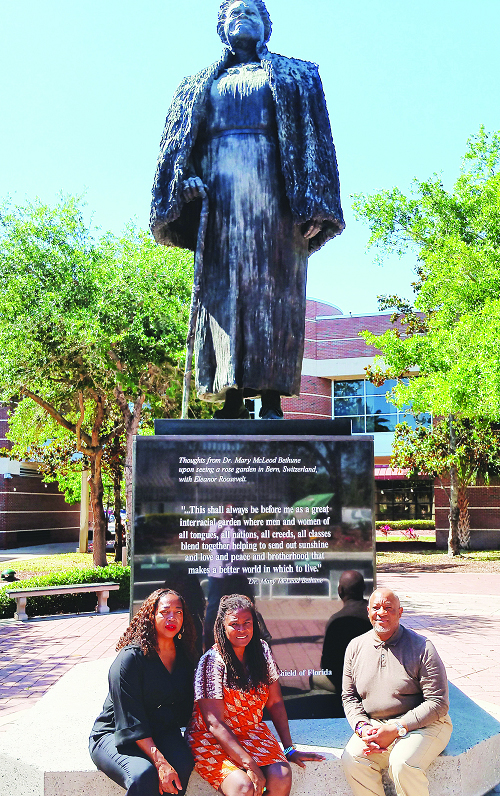Submitted By Andreas Butler
(Source: Florida Courier )
The Association of Black Psychologists (ABPsi) will hold its 56th Annual International Convention on the campus of Bethune-Cookman University in Daytona Beach from July 30 to Aug. 3.
This year ‘s theme, “Returning to Spirit: The Essence of Who We Be,” promises to be a thought-provoking experience in African/Black Psychology providing a space for intellectual discourse, cultural engagement and professional development.
The APBsi has a long history of working with historically Black colleges and universities (HBCUs).
“We wanted it at an HBCU. We work with HBCUs and have relationships with several. We had a conversation with Dr. Jermaine at FAMU, which has the only graduate program in psychology. B-CU came up. It was their 120th anniversary this year. Dr. Jermaine called Dr. Hollar and, after speaking to Dr. Hollar, Bethune-Cookman be- came our location for the conference,” said Dr. Sharon Bethea, president of ABPsi.
Dr. Daniel Hollar is Associate Professor of Psychology at Bethune-Cookman Univrsity. He also serves as Assistant Dean and Department Chair. Dr. Jermaine Robertson is Professor of Psychology at Florida A&M University (FAMU).
Free Community Day
The Association of Black Psychologists was created in 1968 from an American Psychological Association meeting with 200 Black psychologist in various professional fields. Today the organization has over 1,400 members.
The convention will include:
Speakers from renowned African-centered psychologists and thought leaders who will address critical issues in African/Black psychology and well-being
Presentations and panels focusing on cutting-edge research
Special tributes that will recognize the contributions of pioneers in African/Black psychology
Community engagement and advocacy
The three-day event is filled with seminars and speaking and interactive engagement. There will be a Community Day on Saturday, Aug. 2 from 9 a.m. to 2 p.m., which is free and open the public.
“We have poster sessions where the community can talk to people doing the research and engage with others in the field. We have short inside -talks.
There is a session where people in the community will speak on what pertains to people in Daytona Beach. We would love for the community to come that day,” Bethea stressed.
“We want professionals, including mental health counselors, case workers, teachers, clergy, or any related field related to attend the entire conference.”
Blacks, mental health and stigma
There is a stigma in health care with Black Americans, including a saying that they don’t regularly see doctors. That also exists in mental health; however, mental health professionals beg to differ.
“There are many ways that Black people seek help. I think in many ways Blacks get the wrong end of the stick with that stigma. Most people don’t seek professional help. It’s not people’s first choice, Bethea explained. They consider therapy as “an upper-class phenomenon, a European concept and it costs money. Most Blacks go to family, church, nature and more.’’
She noted, “There are many reasons why we don’t go. Just look at our generational experience with racism, injustice and some of the medical experiments done to us. The stigma is more with distrust throughout history amongst our people with the health care system.
Bethea further stated, “Only 4 percent of therapists are Black. People do better with therapists that look like them. We aren’t getting the training and job certifications at high rates in the field. There is a lack of confidence in these institutions.
“There are institutions with reputations for mistreating Blacks, for example, the Dozier School for Boys and the Tuskegee Syphilis project. Blacks are more likely to keep their business in their household.”
‘Talk about it’
The ABPsi works to help people deal with mental health and mental well-being. The association has numerous programs with organizations, businesses and educational institutions.
“We work strictly with well-beings. We believe if you’re well you can deal with other issues. We don’t deal with politics or economics but the mental health and well-being of Black Americans. We also work with students to get more Blacks in careers in the field. We have healing circles where we talk about issues,” Bethea shared.
“We provide supportive environments promoting social strength and emotional well-being in the community. We do in-school consultations. We’re equipped with resources needed to help Black people with mental and emotional well-being.”
Anyone who needs or wants help with mental health, help is available.
“Talk about it. People are often embarrassed. Go to someone and talk about it. Then use your resources in the community. Find those spaces that address these issues and get to them,” Bethea added.

